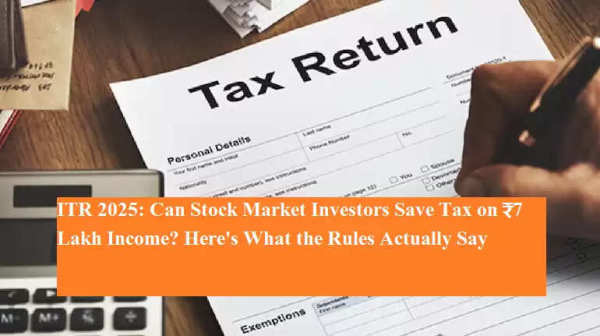
Can Small Investors Save Tax in 2025? Know Rules on ₹7 Lakh Income and Capital Gains Under New Tax Regime
As the deadline for filing Income Tax Returns (ITR) for the financial year 2024-25 approaches, retail investors — especially those using the new tax regime — are raising a critical question: Can individuals with capital gains from equity investments still claim zero tax if their income is up to ₹7 lakh?
On the surface, the answer might seem like a yes — but the real situation is far more nuanced.
Under the new income tax regime, Section 87A provides a tax rebate of up to ₹25,000 for individuals whose total taxable income does not exceed ₹7 lakh. This essentially brings the net tax liability down to zero.
However, the Finance Act 2025 introduced a key clarification that makes a big difference for investors:
If your income includes capital gains that fall under Section 111A (Short-Term Capital Gains or STCG) or Section 112A (Long-Term Capital Gains or LTCG) — which attract special tax rates, the Section 87A rebate does not apply.
Let’s break it down.
If your ₹7 lakh income includes STCG or LTCG from equity shares or equity mutual funds, then you cannot claim the rebate under Section 87A — even if your total income is within the ₹7 lakh limit. This is because capital gains from such instruments are taxed at special rates, not regular slab rates, and are excluded from the rebate benefit.
In simple terms:
No, you can't escape tax if your ₹7 lakh includes capital gains from equity assets taxed under Section 111A or 112A.
Despite this limitation, there are specific conditions under which investors may still avoid tax, even with capital gains:
If your total income — including capital gains — stays within ₹3 lakh (the basic exemption under the new regime), you owe no tax.
Example:
Basic income: ₹1 lakh
Capital gains (STCG + LTCG): ₹2 lakh
Total income: ₹3 lakh → No tax
In such cases, capital gains are absorbed within the basic exemption limit, and you don’t need to pay tax, even though Section 87A does not apply.
There’s another scenario where Section 87A can be used:
If your capital gains come from sources taxed under normal slab rates, such as:
Debt mutual funds purchased after April 1, 2023
Short-term capital gains from real estate or gold
In these cases, since the income is taxed under slab rates — not special rates — you can claim the ₹25,000 rebate under Section 87A, potentially bringing your tax liability to zero.
| Condition | Can Claim Zero Tax (Section 87A)? |
|---|---|
| Income includes STCG/LTCG under Sections 111A/112A | ❌ No |
| Total income ≤ ₹3 lakh (including capital gains) | ✅ Yes |
| Capital gains from debt funds/real estate (slab rate) | ✅ Yes |
Small stock market investors must tread carefully under the new tax regime. While a ₹7 lakh income might sound like a safe tax-free threshold, the source and nature of income matter more than the total amount.
If your capital gains are from equity instruments attracting special rates, you’re not eligible for the rebate — and may have to pay tax even on sub-₹7 lakh income. However, staying within the ₹3 lakh exemption or earning gains from slab-taxed sources could still offer complete tax relief.